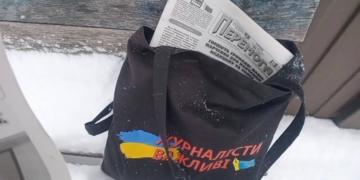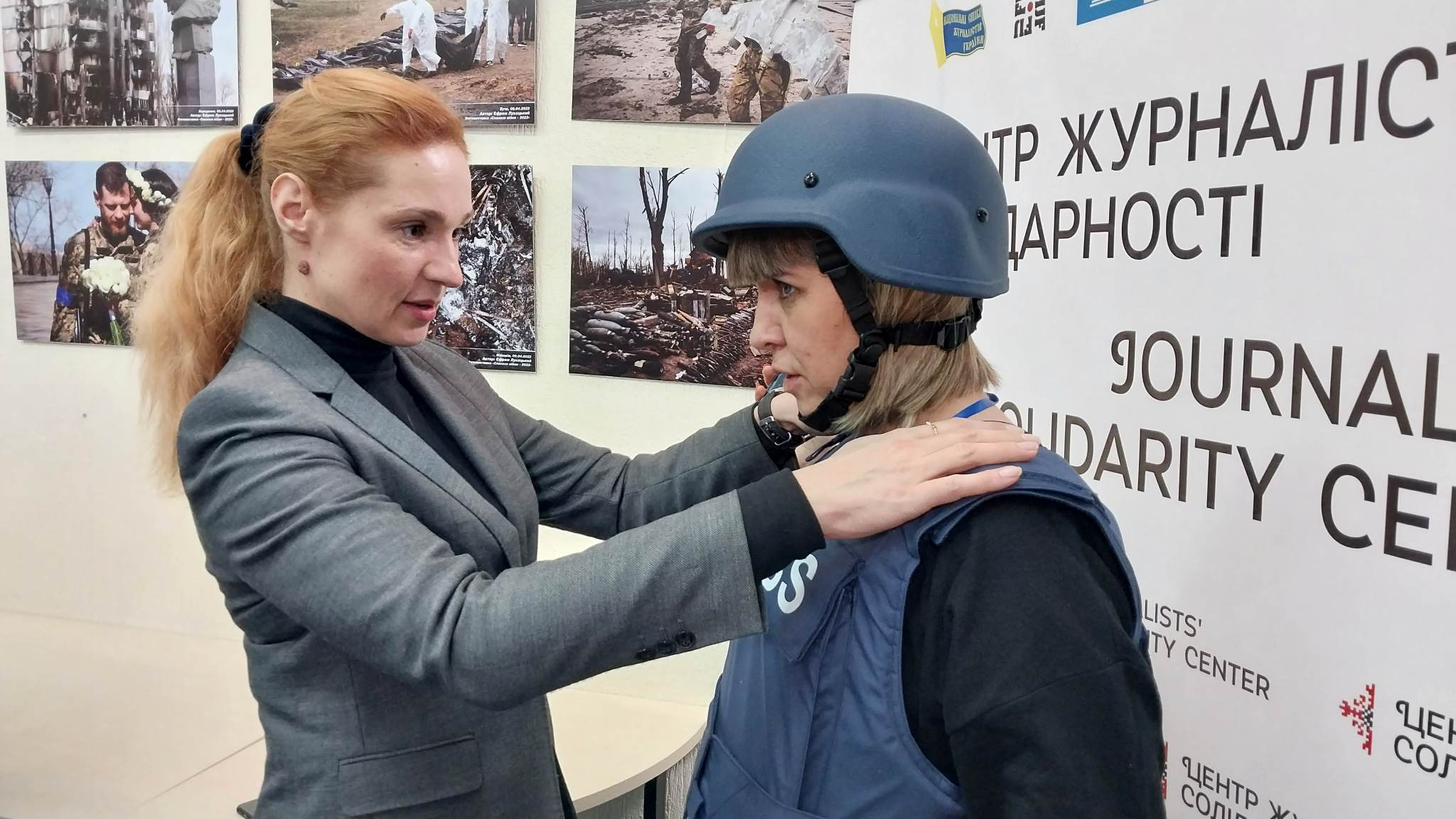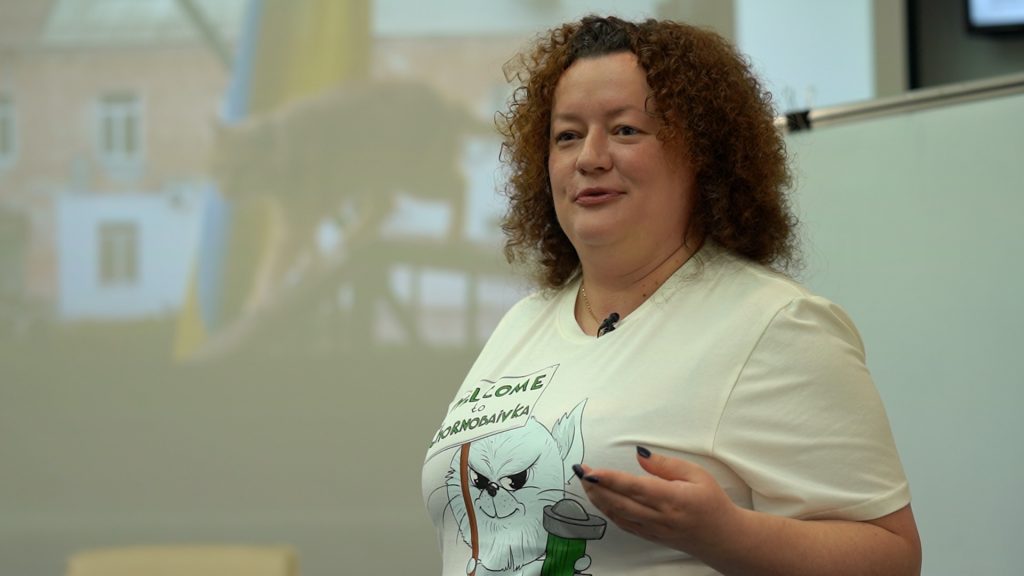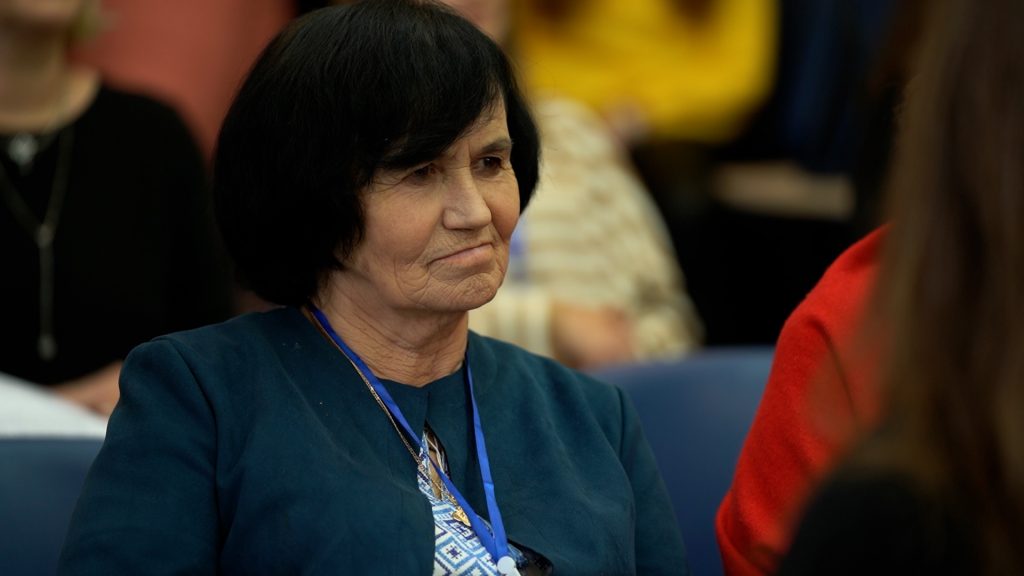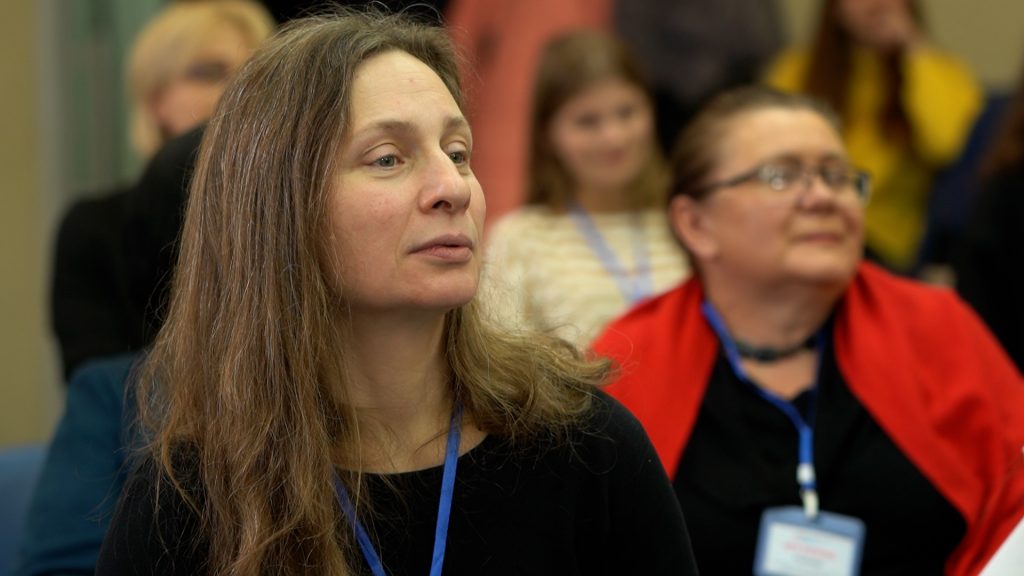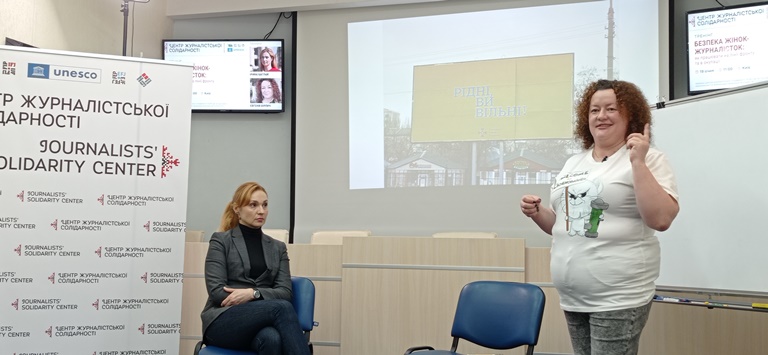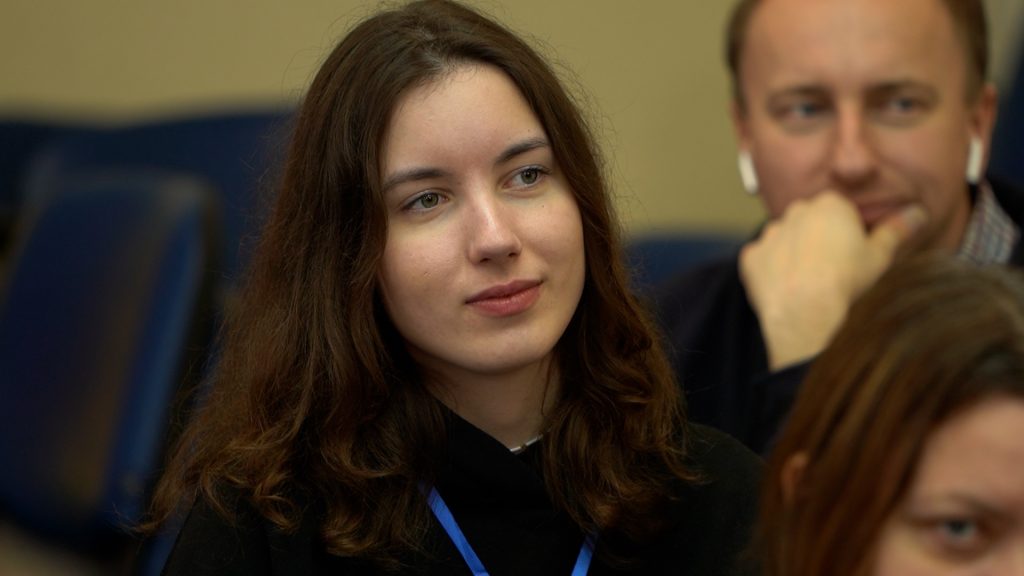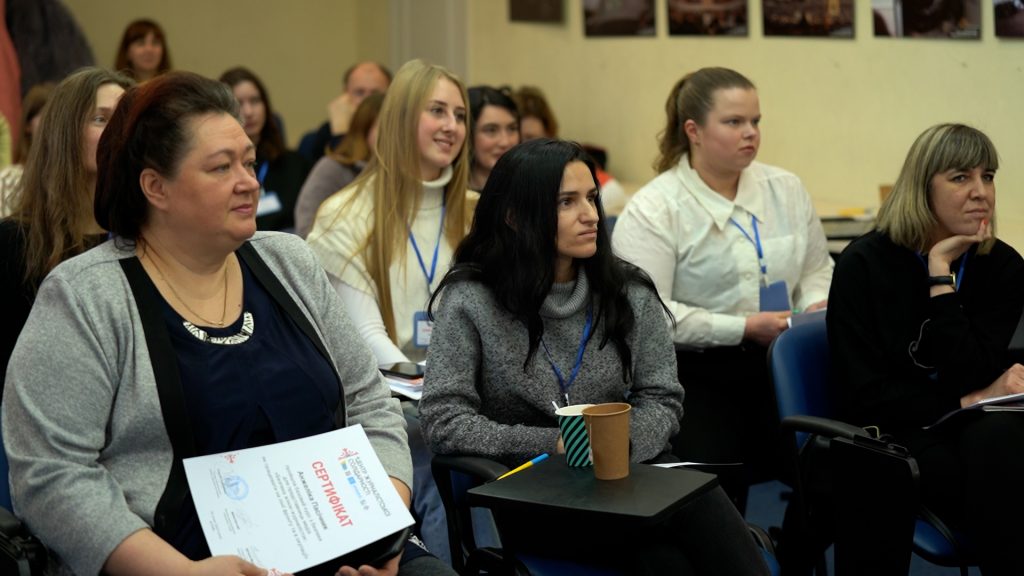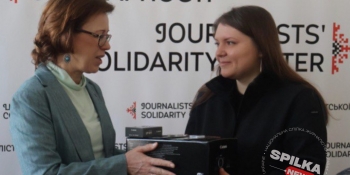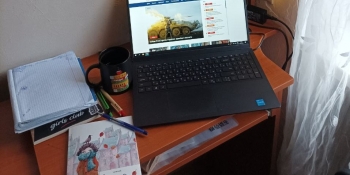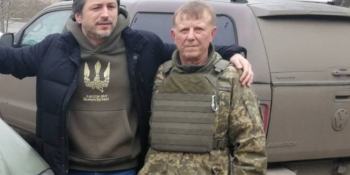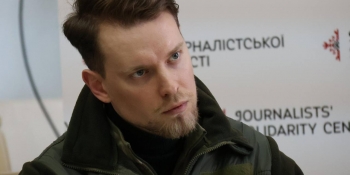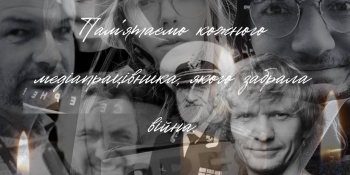How can women in the media minimize the risks of getting into trouble while working on the front line or in the occupation? This was discussed on January 19 during the training session entitled Safety of Female Journalists: How to Work on the front line and in the Occupation?, which was held at the Kyiv Journalist Solidarity Center of the National Union of Journalists of Ukraine (NUJU).
The training was conducted by Iryna Bahlai, a well-known TV journalist with extensive experience of working on the front line, and Yevheniya Virlych, the editor-in-chief of the Kherson Kavun.City publication, who had worked in the occupation until July.
“The safety of journalists is one of the priorities of the NUJU. Thanks to the support of international partners, today we have more than 200 bulletproof vests, which we provide free of charge to journalists for conducting their professional duties. Of these, we received 125 bulletproof vests complete with helmets of the highest degree of protection from UNESCO,” said Sergiy Tomilenko, the President of the NUJU, opening the training.
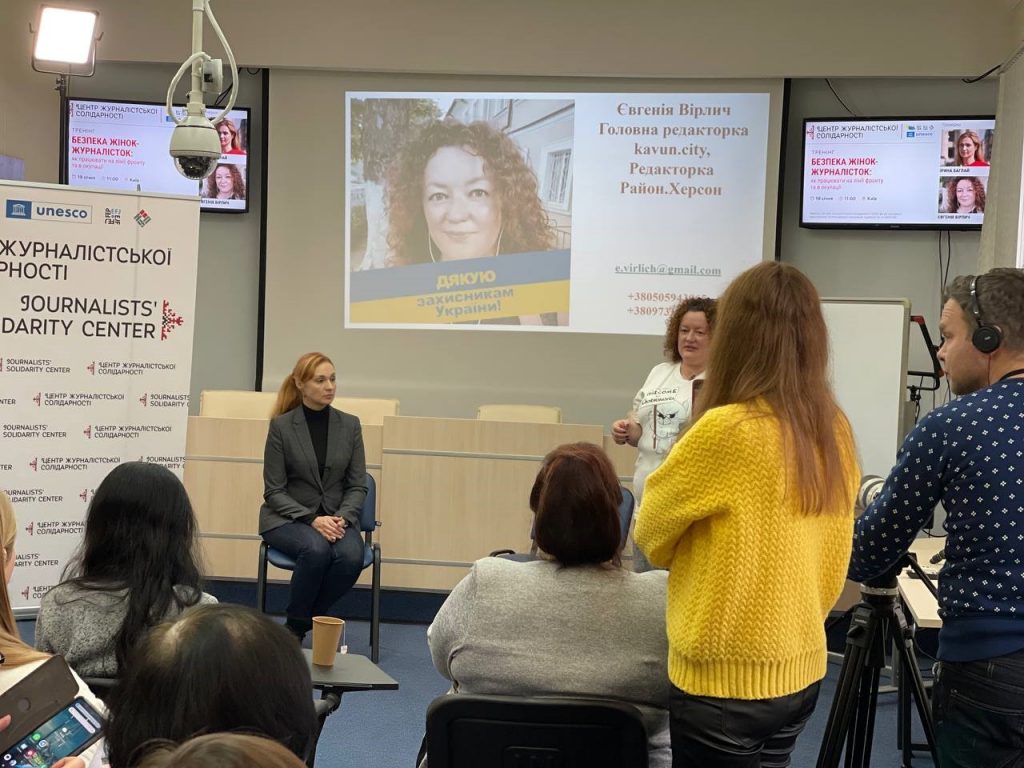
Lina Kushch, the first secretary of the NUJU, emphasized that issues of women’s safety always have their own specifics.
“I went down into a mine 10 times, and every time shoes were a problem for women. Therefore, when we started looking for bulletproof vests, the Union tried to get bulletproof vests for female journalists as well, because men’s ones do not always fit,” said Lina Kushch, who comes from the Donetsk Region.
From the first days of the war, it became clear that female journalists had more problems with accreditation than male ones. As for work in the conditions of temporary occupation, as it turned out, this topic was relevant mostly for women.
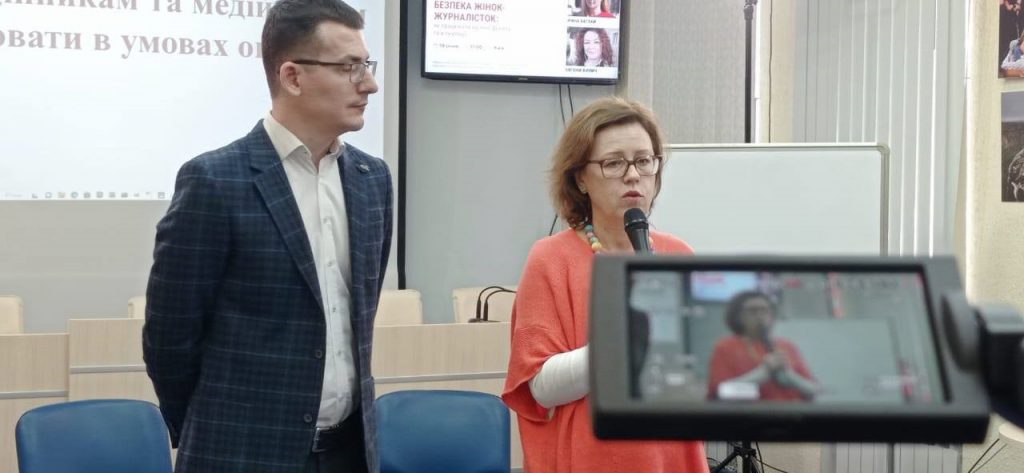
“The hotline of the NUJU was mainly contacted by female journalists about working in the occupation. We did not expect such a surge of applications. A webinar on this issue was organized in March. They gave advice and answered many questions of those media men and women who were staying in the occupation. We were even asked about “accreditation to work in the occupation…,” Lina Kushch said.
Yevheniya Virlych: Everyone is equally unprotected in the occupation
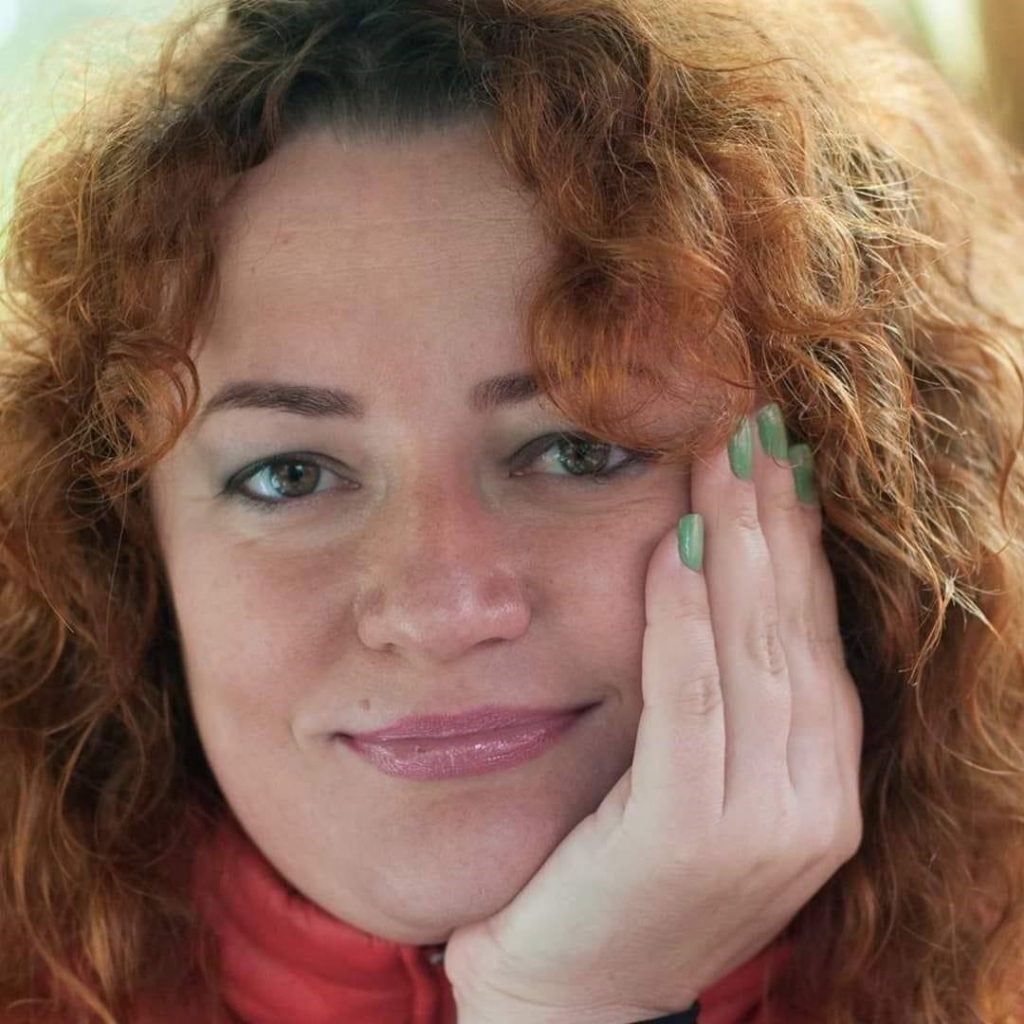
According to trainer Yevheniya Virlych, who has considerable experience working in the territories occupied by the Russians, “everyone is equally vulnerable in the occupation.”
“However, the occupiers hate men purely physiologically. They are ready to mock, kill slowly, crate a ‘scary’ picture for their television. However, it is impossible to say that women in captivity are in any better situation,” she said.
The journalist told her own story of working in the occupation. According to her, her husband and she were helped to survive by gossip that their couple “fled to Poland.” In fact, they went to this country even before the war and managed to return.
“On March 5, a large rally, which we informed our readers about, took place in Kherson. We started to receive response from “friends”: “What are you commenting on? You are in Poland!” We were happy about it. We sat quietly and were glad that no one knew that we were at home. We only informed the NUJU to spread the information in case we disappeared even for a day. Someone near the front door tore out our electric meter, but we invited an electrician we knew and continued to work. Yes, we survived on gossip for almost a month,” says Yevheniya Virlych.
So, she advised everyone who found themselves in the occupation to hide if possible and pretend to be out of the city.
“That is a great solution!” said Yevheniya Virlych. However, she warned that this would be possible only in a large community. It is impossible to “hide” like that in a small town or a village.
“If you are staying in the occupation, think about what lies you can spread about yourself to be safe,” says the journalist.
She along with her husband was exposed on May 1. Yevheniya went to the hairdresser – she thought she had become inconspicuous enough, and the enemy would not see her. But they did.
“If you have paranoia, that’s great. My husband tells me that paranoia saved us during the occupation. The circle of friends in the occupation is a test of authenticity. We made all our relatives and acquaintances think we had left. They themselves told their loved ones about it so that they would not come. Because it would be very easy to follow them. Trusted people must not be relatives. Less emotion, more common sense,” the journalist jokes.
According to Yevheniya Virlych, the occupiers lured the person they needed more than once through acquaintances. This is how the famous Kherson journalist Oleh Baturin was captured. A good friend called him and asked to meet.
“I was personally lured by an offer to go to the local history museum. I thank the person who suddenly called me to the local history museum in June. After all, at that time, everyone already knew that the director of the museum had become a collaborator,” says Yevheniya Virlych.
She emphasizes that during the occupation, you should always think about evacuation, even if you dream of meeting the Armed Forces of Ukraine in your city.
“Before leaving, subscribe to Russian Telegram channels and delete all Ukrainian ones and websites. God forbid they will see the words ‘ruscist’ or ‘orc’. They have equipment that can connect to your phone and listen to everything you talked about through Russian SIM cards. Be ready for it. If asked why there are so few phone calls recorded on the phone, say that “the connection had been discontinued, something had been deleted, and that’s how it really happened.” Pretend to be a naive girl, a person with a “neutral” profession. I called myself a math teacher, because the media workers would not leave the occupation so easily. It is better to remain silent about any connections with journalism. If a man has a beard, advise him to shave it off so that he is not mistaken for an Azov man. My husband accidentally cut himself while shaving. He first aided the cut and pretended to be a fool,” says the journalist.
According to the journalist, her husband and she had to get through 40 enemy checkpoints to leave Kherson. At 28 of them, they were searched…
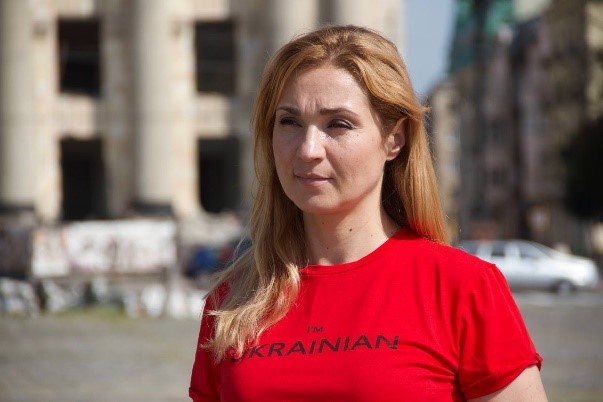
“The goal is to survive!”
War journalist Iryna Bahlai has been making stories from the front since 2014. She also worked in the anti-terrorist operation zone in the Luhansk Region. A TV presenter with 22 years of experience, who comes from Vinnytsia, has been living and working in Kyiv since 2008.
“For the last eight years, my life has been connected with the war. During the war, I learned to turn off the ability of a journalist, especially a female journalist, to let everything pass through me. I learned a lot from the military,” says the journalist.
Iryna Bahlai’s military career began with a three-day undercover trip to already occupied Luhansk. Her colleague from Donbas and she pretended to be a couple going to the boy’s parents. But Irina’s Vinnytsia registration in Luhansk immediately raised questions… And the first terrible impression was a roadblock under the Russian flag, where unpresentable-looking men were standing, to whom coffee was served… by a Ukrainian traffic officer.
“I do share Yevheniya Virlych’s opinion that war is equally dangerous for men and women: the occupiers do not care if you are a man, a woman or a child. However, the widespread opinion about the “weakness” of a woman plays in favor of her safety. I was practically not asked for documents. It was even possible to make direct inclusions – without any scandal. “She looks pretty, let her work,” someone said. However, after two weeks we began to notice “accompaniment”. Masked people with assault rifles began to appear near our apartment, once they were trying to break into the apartment. But we were lucky. And the illusion of security began to appear. One evening, I went to have dinner in a restaurant, and three people approached me. They offered to “take a break” with drugs. I became very scared. But God saved me then,” says Iryna Bahlai.
The next time, Iryna was sent to the frontline of the Anti-Terrorist Operation, near Slovyansk. Together with the paratroopers, she passed two ambushes, came under sniper fire. But there was no real sense of danger until she saw for the first time what is called the “consequences of war”.
“Today, we are all going through this experience. We are all on the front lines today because we see these consequences. We all see footage from Mariupol, Kherson. It is very difficult, especially if you have visited these cities before…,” says the journalist.
On that first trip to the front line, Irina was struck by the fact that the 25-year-old boys who had passed through two months of fighting looked at her not as a man to a woman, but as a father to a child… or as a person to an angel. “A woman is nearby – it means life goes on!” – they probably thought.
“I only encountered sexism at the front line from a few colleagues. Like, they let you in here and there because you’re pretty, you smiled – and that’s it… Such words are insulting! But the military is used to thinking differently: women and children are those who must be protected, sometimes even at the cost of their lives. They develop such a peculiar “instinct of protection”. However, this instinct has another side: they say, you are a woman, weak, you cannot cope. It seems to some military personnel that because of “female weakness” they may have problems with us in a difficult situation. One brigade commanding officer, surprised by my endurance, for some reason decided that I was a climber…,” the journalist says.
But in fact, as Iryna Bahlai emphasizes, every journalist, going to work at the front, should be critical of his physical endurance. Not everyone has a strong enough spine and strong muscles to wear a heavy bulletproof vest for hours and cover long distances on foot or run in dangerous conditions. Back problems are a fairly common problem, even for physically strong people.
The support and friendly advice of experienced war correspondents, who are ready to explain what should and should not be done at the front, how to dress and wear shoes, is of great importance for novice journalists.
“Sometimes it is inappropriate for a woman to shoot on an armored personnel carrier in a fur coat in winter or in short shorts in summer. You can’t do that, but we learn everything. Because until recently, we did not have rules on how to work in the zone of combat children. We are now writing these rules ourselves, with our stories, our experience,” says the journalist.
In her opinion, women’s emotionality and tendency to “take events to their heart” can become a problem for female journalists. Therefore, the presence of psychological hotlines, the help of psychologists is a great asset.
“Until recently, it was believed that “you can’t whine”, and there was a fear that if you “whine”, you will no longer be allowed to work in the war zone. And you solve your problems yourself. Because problems arise, and that’s normal! Then the soldiers had the opportunity to work with psychotherapists, and we learned that periodic psychotherapeutic assistance is necessary. But it should be not just a psychologist, but a specialist in post-traumatic stress disorder (PTSD). Such specialists call themselves “sanitizers” because they clean out of you the “shit of war” that appears in your soul if you work in the war. You can only be completely cleansed when you have left the combat zone…, ” recalls Iryna.
Iryna says that while working at the front, she began to lose friends. Constant thoughts about how to survive during shelling change a person, and when they later go to a barbecue with the friends, everyone is happy, but they are crying.
“It is necessary to treat the psyche, it is not a shame!” emphasizes Iryna.
Among the practical tips, the journalist mentioned the following: “It is better to go to the combat zone in pairs, so that there is someone to save in a difficult situation. And also – it is very good to understand where exactly you are going. At one time in Donbas, Iryna asked a local resident “how to get to our checkpoint,” and in his understanding, “our” was Russian. Seeing the Russian flag, the editorial driver turned around and quickly drove in the opposite direction. That time I was lucky… “
“The Ministry of Defense explains to journalists how to behave in captivity. There is no need to play heroism in captivity. Everything they wanted to know, they already know. Say everything you know and even play along with them. If they say that the president is bad, Ukraine is bad – agree. The task is to survive,” says Iryna.
According to her, the main tool for survival in a difficult situation is solidarity, communication, careful exchange of information.
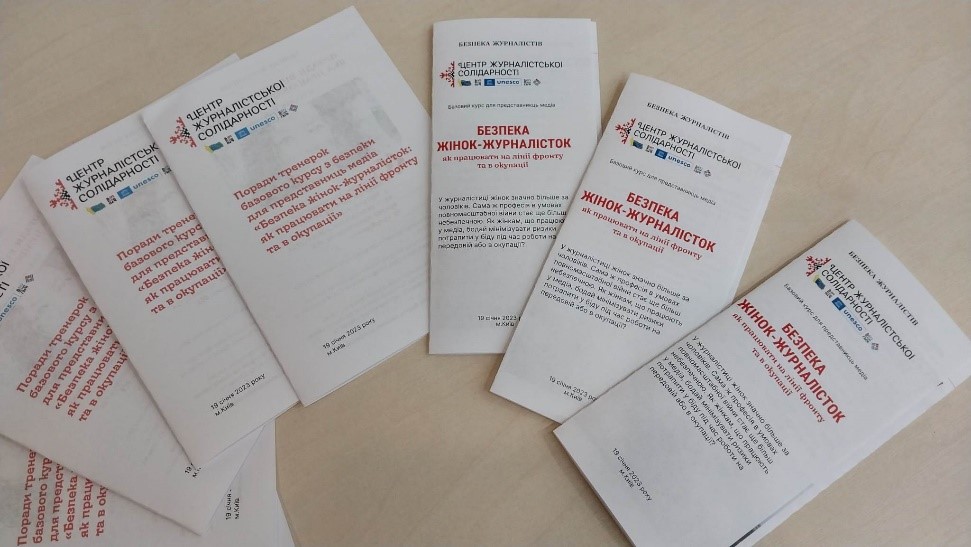
“Such trainings are important: the war is not over”
“We are already used to the high level of training events held by the NUJU. The very first online trainings organized by the NUJU after the start of the war were very useful to me and helped me survive the occupation and when I left. I consider Irina Bahlai’s advice useful for me.
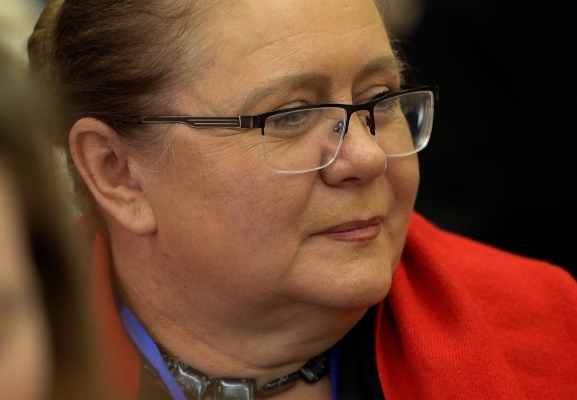
“We do not know how the circumstances of the war will change and who among us will have to perform professional duties in the combat zone or in the de-occupied territories. There was a lot of new information for me. I believe that such educational trainings are also necessary because they provide an opportunity to communicate with people from different regions, with different life experiences and journalistic activities. I am glad that the NUJU keeps its finger on the pulse of the real, urgent needs of media workers,” noted Vita Kopenko, a participant of the training / journalist from Nyzhni Sirohozy in the Kherson Region, who continued to live in her hometown during the occupation, and who left for the territory controlled by Ukraine only in August.
Vita Kopenko also added that the conditions of occupation differed greatly both in different parts of the territories occupied by the Russians and in different time periods. For example, if Yevheniya Virlych could call herself a math teacher at a Russian checkpoint in July, then already in August, when preparations for the new school year were underway, schoolteachers were no longer released from the occupation. Therefore, when leaving, it is important to understand what is checked at the checkpoints and what is required.
Suspilne journalist Nataliya Shostak says that in the conditions of war, the experience shared by female trainers is invaluable.
“I never thought I would study with Iryna Bahlai, because due to certain health restrictions, I never went to war. In addition, I am not very patient, so I understood that I would probably be a nuisance there. But at the beginning of the war, Kyiv became a front-line city, and ordinary work became work near the combat zone. Thank God that the enemies did not enter Kyiv. But the experience shared by Evgenia Virlych is important, because the war is not over. None of us knows where they will be tomorrow. So, this meeting was very meaningful for me,” says the journalist.
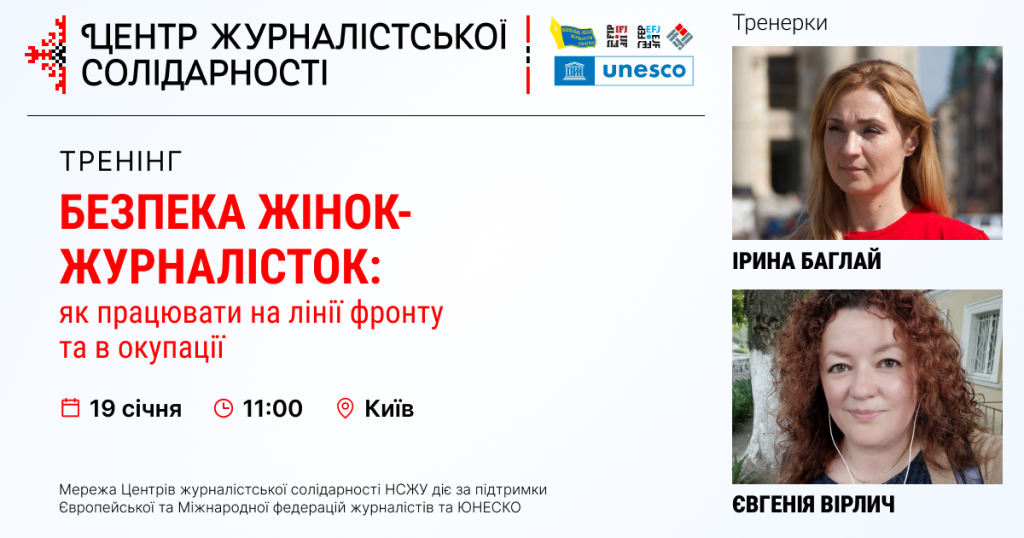
As part of the Safety of Female Journalists project, a roundtable was held in Zaporizhzhia on January 19. It was dedicated to Obstruction to Professional Activity. External and Internal Censorship. Immigrant journalists and representatives of local mass media took part in the event. The event was also attended by teachers and students of the Faculty of Journalism of Zaporizhzhia National University.
Journalist Solidarity Centers are an initiative of the NUJU implemented with the support of the International and European Federations of Journalists, as well as UNESCO. They are aimed at helping media representatives working in Ukraine during the war. The centers operate in Kyiv, Lviv, Ivano-Frankivsk, Chernivtsi, Zaporizhzhia, Dnipro and provide journalists with organizational, technical, legal, psychological, and other types of assistance.
About UNESCO
UNESCO is the United Nations Educational, Scientific and Cultural Organization. It contributes to peace and security by promoting international cooperation in education, sciences, culture, communication and information. UNESCO promotes knowledge sharing and the free flow of ideas to accelerate mutual understanding. It is the coordinator of the UN Plan of Action on the Safety of Journalists and the Issue of Impunity, which aims to create a free and safe environment for journalists and media workers, thus strengthening peace, democracy and sustainable development worldwide. UNESCO is working closely with its partner organizations in Ukraine to provide support to journalists on the ground.
The designations employed and the presentation of material throughout this publication do not imply the expression of any opinion whatsoever on the part of UNESCO concerning the legal status of any country, territory, city or area or its authorities, or concerning the delimitation of its frontiers or boundaries.
The author is responsible for the choice and the presentation of the facts contained in this publication and for the opinions expressed therein, which are not necessarily those of UNESCO and do not commit the Organization.
NUJU information service





